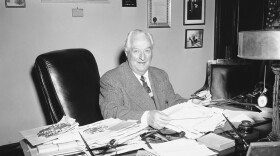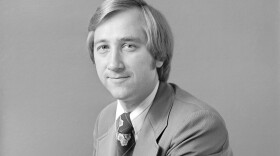Half a century ago, Nevada had a midterm election that didn’t seem all that significant. But maybe it was?
1968 was a tumultuous year, with the King and Kennedy assassinations, the Vietnam War and opposition to it, and violence at the Democratic national convention in Chicago. Richard Nixon wound up winning the presidency with only forty-three percent of the popular vote but a clear electoral majority over Democrat Hubert Humphrey and Independent American George Wallace.
Nixon did have a connection to Nevada. Not only was he a native of our neighbor to the west, but his wife Pat had been born Thelma Catherine Ryan in a rented home on Campton Street in Ely in 1912. Now we also know that he had a series of connections to Howard Hughes. In 1968, Hughes had completed most of his Nevada buying spree. His representatives slipped money to the Nixon and Humphrey campaigns in hopes one of them would stop the bombs at the Nevada Test Site, which bothered Hughes. They didn’t, but there were other ties. Hughes had lent money to Nixon’s younger brother. Hughes employed as a lobbyist Lawrence O’Brien, who was a Democratic party honcho. Nixon’s reelection campaign reportedly wanted to know more about those ties, and decided to bug Democratic headquarters in Washington, D.C., at the Watergate. Some of the Nevada connections didn’t pan out well for Nixon.
We’re just coming off a tough U.S. Senate race in Nevada, and we also had one in 1968. Democrat Alan Bible was seeking his fourth term. On the one hand, Bible had delivered big for Nevada, bringing home a lot of federal money, and the state had a tradition of sticking with powerful Senate incumbents. That described Bible, who was on the Appropriations committee, and served on the Interior committee, where he could do a lot for the state, ranging from protecting the mining industry to delivering the Southern Nevada Water Project to Clark County.
On the other hand, Bible was close to Lyndon Johnson. Earlier in 1968, Johnson declared he wouldn’t seek reelection. He was unpopular on both sides of the aisle for the Vietnam War—with liberals for waging it, and with conservatives for not winning it. His Great Society programs went too far for the right, not far enough for the left. Bible had long trumpeted their close relationship. This time, Bible didn’t talk about it.
Bible also had a tough Republican opponent. Las Vegas businessman Ed Fike had just been elected lieutenant governor two years before. He attacked Bible over his ties to LBJ, but that went nowhere. As Fike put it, “To hear the senator talk today, you’d hardly think he knew Lyndon Johnson.” Bible emphasized his power and seniority with the slogan, “Nevada is stronger with Bible.”
Bible proved stronger than Fike electorally, winning by about 17,000 votes out of more than 150,000 cast. Congressman Walter Baring, who ran as a Democrat but was much closer to Republicans, easily won reelection. Democrats won the state senate and Republicans took the assembly.
By the way, the 1968 voting brought a couple of political newcomers to the assembly. That year marked the election of a young attorney from Henderson named Harry Reid, who went on to do some other things … and the first electoral victory for a Las Vegas lawyer who stuck with politics and now reads history features for Nevada Public Radio. Whatever became of HIM?







